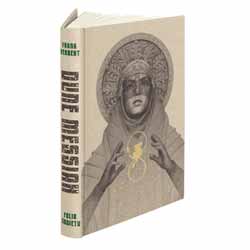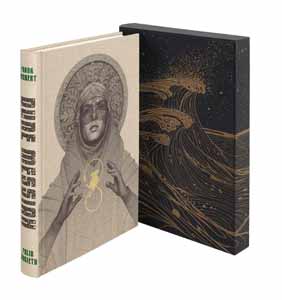|
Click here to return to the main site. Book Review
The London Folio Society publishes a special edition hardback version of Dune: Messiah, by Frank Herbert. The science fiction book saga Dune ran to six books (initially!); Dune: Messiah was the second, and so this follows The Folio Society’s special release of the opener. It is a stunning book to behold; lovingly constructed. It’s bound in printed and blocked metallic cloth and set in Dante with Helvetica Neue and Black Tulip display. There is a gorgeous Frontispiece, 7 beautiful colour illustrations (one of them a double-page spread) by talented Dune fan Hilary Clarcq, and 10 black and white chapter headings. There is also an Endpaper map by Martin Sanders. The book cover design is something special which sets the tone for the quality of this release and its classic content. The Printed Slipcase is thick, heavy and shaped in the same manner as its predecessor. Further, this edition contains Herbert’s little used ‘Death Cell Interview’ prologue – which works as a catch-up of the events in the first book, Dune. If you are a fan of Frank Herbert or science fiction in general, you are going to need this in your collection. If you are a follower of sci-fi then you will surely be aware of Dune – if not through the books, then surely awareness of the 1984 and more recent films and the TV series. You’ll at least know about giant worms and spice! So, I won’t recap on the first book, except to say that Paul Atreides is born the Muad'Dib and has the power of prescience. He is tutored by his mother and by the end of the book becomes Emperor of the Known Universe. By the beginning of Dune: Messiah, Paul has ruled for 12 years. However, a devastating galaxy-wide war is triggered by his ascension, as the religious order and the politicians clash and he is powerless to stop it. Even some of his friends scheme to have him removed from his position. But Paul’s possible visions of the future could mean that the death of billions and the destruction of multiple planets may be the only path to enlightenment and man’s assured place in the universe. I read the first three books in this series when I was in my twenties, alongside other ground-breaking SF authors such as Robert A. Heinlein, Arthur C. Clarke, Alan Dead Foster, Orson Scott Card, Isaac Asimov and many others. I lapped them all up. It’s always difficult returning to loved titles, because there is always a chance you will become disillusioned; your treasured memories of a classic becoming tarnished. However, the favourites I have reread have only reaffirmed my original assessments. They are not loved by legions of fans for no reason. I found this one compelling from the outset. Whereas Dune is more of a grand adventure, Messiah seems more character-driven, with no out-and-out hero or villain. We all have shades of grey, after all (no, not those ones!). It is at times downbeat: the pressures of office don’t even come close, but the whole is captivating and, arguably, better than its predecessor – although Dune sets-up the boundaries without which Messiah would not have worked half as well. 10 Ty Power
|
|---|

